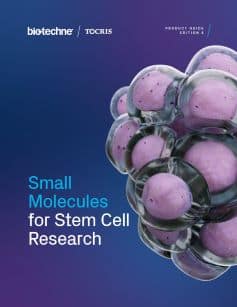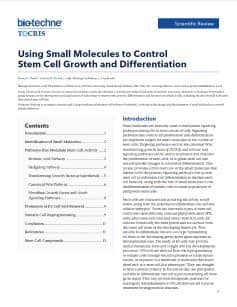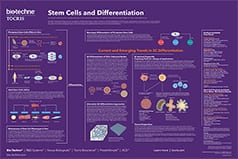Glycogen Synthase Kinase 3
Glycogen synthase kinase 3 (GSK-3), EC 2.7.11.26, is a serine-threonine kinase with two isoforms (α and β), that was originally discovered as an important enzyme in glycogen metabolism. GSK-3 was subsequently shown to function in cellular division, proliferation, motility and survival.
Glycogen Synthase Kinase 3 Inhibitors |
|
|---|---|
| Cat. No. | Product Name / Activity |
| 4431 | A 1070722 |
| Highly potent, selective GSK-3 inhibitor | |
| 3966 | AR-A 014418 |
| Selective GSK-3 inhibitor | |
| 7650 | AZD 2858 |
| Highly potent GSK-3 inhibitor; inhibits tau phosphorylation | |
| 3194 | BIO |
| Potent GSK-3 inhibitor; also inhibits cdks | |
| 6695 | CHIR 98014 |
| Highly potent and selective GSK-3 inhibitor | |
| 4423 | CHIR 99021 |
| Highly selective GSK-3 inhibitor; acts as Wnt activator | |
| 4953 | CHIR 99021 trihydrochloride |
| Hydrochloride salt of CHIR 99021 (Cat. No. 4423); selective GSK-3 inhibitor | |
| 8170 | CHIR 99021 in solution |
| Sterile-filtered 10 mM solution of CHIR 99021 pre-dissolved in DMSO | |
| 1398 | Kenpaullone |
| GSK-3β inhibitor; also inhibits cdks | |
| 1616 | SB 216763 |
| Potent, selective GSK-3 inhibitor | |
| 1617 | SB 415286 |
| Potent, selective GSK-3 inhibitor | |
| 4353 | TC-G 24 |
| Potent and selective GSK-3β inhibitor | |
| 3869 | TCS 2002 |
| Potent GSK-3β inhibitor | |
| 6092 | TDZD 8 |
| Selective non-ATP competitive inhibitor of GSK 3β | |
| 7405 | TWS 119 |
| Potent GSK3 inhibitor; induces neuronal and CD8(+) T cell differentiation | |
Degraders |
|
| Cat. No. | Product Name / Activity |
| 7651 | PT-65 |
| Potent GSK3 Degrader | |
The serine/threonine kinase Glycogen synthase kinase 3 (GSK-3) has two isoforms (α and β). GSK-3 is a key enzyme in glycogen metabolism, as well as cell division, proliferation, motility and survival. The enzyme plays a role in a number of pathological conditions, including cancer, diabetes and neurological diseases.
GSK-3 phosphorylates tau and presenilin-1, which are involved in the development of Alzheimer's disease. Both isoforms of GSK-3 are ubiquitously expressed, although particularly high levels of GSK-3β (also known as tau-protein kinase) are found in the brain, where it is involved in synaptic plasticity, possibly via regulation of NMDA receptor trafficking. GSK-3 phosphorylates over 40 different substrates including signaling proteins, transcription factors and structural proteins, and is part of the signal transduction cascade of a large number of growth factors and cytokines.
The activity of GSK is regulated by phosphorylation (Akt, S6K, RSK, PKA and PKC), dephosphorylation (PP1 and PP2A), and by binding to protein complexes. GSK-3β is a component of the canonical Wnt signaling pathway, forming part of a "destruction complex" with axin, APC, and casein kinase 1α (CK1α). In the absence of Wnt binding to its receptor, β-catenin the main signaling molecule in the Wnt pathway, binds axin and is phosphorylated by GSK-3β and CK1α. This tags β-catenin for ubiquitination and subsequent degradation by the proteasome, so maintaining low levels of β-catenin in the cytoplasm. Activation of Wnt receptors leads to inhibition of the destruction complex, including GSK-3β, resulting in accumulation of β-catenin, its translocation to the nucleus and the activation of transcription factors associated with pluripotency. Wnt signaling is important in stem cell differentiation and proliferation during embryogenesis as well as in adult tissues. It is also important in the development of the central nervous system and in the maintenance and repair of the adult brain.
GSK-3β is also important in the Hedgehog signaling pathway. Hedgehog proteins bind to a receptor known as Patched, which is internalized and degraded, releasing the G protein-coupled receptor Smoothened (SMO) to the membrane. This inhibits a complex consisting of protein kinase A (PKA), casein kinase 1 (CK1) and GSK-3β, and prevents phosphorylation of the suppressor of fused (SUFU)-glioma-associated oncogene homolog (GLI). This allows the dissociation of the SUFU-GLI complex, enabling translocation of the transcription factors GLI1 and GLI2 to the nucleus and activating transcription of Hh target genes. The Hedgehog pathway is important in embryonic development for the patterning of many tissues and organs. Hh signaling is also important in development of a range of cancers.
GSK-3 inhibitors are widely used in stem cell research for the differentiation and maintenance of cells.
External sources of pharmacological information for Glycogen Synthase Kinase 3 :
Literature for Glycogen Synthase Kinase 3
Tocris offers the following scientific literature for Glycogen Synthase Kinase 3 to showcase our products. We invite you to request* your copy today!
*Please note that Tocris will only send literature to established scientific business / institute addresses.
Stem Cells Scientific Review
Written by Kirsty E. Clarke, Victoria B. Christie, Andy Whiting and Stefan A. Przyborski, this review provides an overview of the use of small molecules in the control of stem cell growth and differentiation. Key signaling pathways are highlighted, and the regulation of ES cell self-renewal and somatic cell reprogramming is discussed. Compounds available from Tocris are listed.




